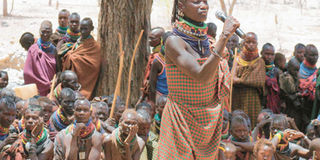Give peasant woman knowledge to empower herself, not tokenism

Turkana women at meeting. Affirmative action is a good idea but making the woman at the grassroots self-sufficient is a better one. PHOTO | FILE | NATION MEDIA GROUP
What you need to know:
What they need is some guidance and help as well as intervention in linking them to the market.
Thankfully, there are shining examples of what guidance and exposure can do to women living in the rural areas and change their economic fortunes.
- They have mobilised other women to learn new farming methods through technology, hard work and persistence.
Angelina Kavithe Francis is a small-scale farmer in Kitui county who dropped out of school at Standard Three. But that did not stop her from addressing a panel at the United Nations headquarters in New York during this year’s Commission on the Status of Women in March.
The married mother of five and grandmother of four was confident as she proudly narrated to a full house how far she has come from a struggling peasant to a successful farmer. She laboured through her English, throwing in a Kiswahili word here and there.
STANDING OVATION
She nevertheless passed her message — to a rousing response and standing ovation to boot! Needless to say, she was impressive.
Kavithe explained how her life and that of her family and groups of women in her village that she has helped to mobilise to get trained have changed after learning new farming methods through technology, hard work and persistence.
She and her neighbours used to work year in, year out without making much of a profit from their small shambas, cultivating mainly tomatoes and maize. This is because middlemen and brokers would rush and buy their produce at throwaway prices, right at their farms, but end up making more profit than the women despite all their toil.
POTENTIAL MARKETS
Kavithe is today a successful horticulture farmer on her three-acre farm. She managed to shrug off the middlemen, bought a motorcycle — which she rides to deliver her tomatoes, spinach and green maize, among other produce, to Kitui and Kwa Vonza markets. She is eyeing two new universities in the locality as potential markets.
For now, Kavithe tells me, her focus is to “emancipate” fellow women to physically go to the market and sell their produce — as opposed to selling to unscrupulous middlemen.
“I make sure I take them there,” Kavithe told me last week, when I called on her, before riding off for the mission. “I hate to see them go through the exploitation that some of us suffered over the years.”
In Murang’a County, some women have been grappling with how to improve productivity of their bananas, add value to them and get a market for the crop.
VALUE ADDITION
Listening to these women, one gets the feeling that what they need is some guidance and help as well as intervention in linking them to the market, value addition and possibly some cottage industries, and they will be good to go.
Thankfully, there is an example and inspiration that these women can learn from. Ms Pauline Kimani from Kigumo grows bananas at her home in Murang’a County and in Juja, in neighbouring Kiambu County. She has managed to do production and value addition to the banana, complete with a cottage industry based at Safari Park Crescent in Nairobi County, where she processes and packages her produce as Pamat Foods.
In Kakamega County, Rosalinda Mukhwana is another successful horticulture woman farmer. When she asked her husband to set aside for her part of the family shamba, where he grew sugarcane, he was, at first, hesitant.
CHANGE FORTUNES
Years later, and a lot of learning through technology, however, Rosalinda is a shining example of what guidance and exposure can do to women living in the rural areas and change their economic fortunes. And her husband, like Kavithe’s, is one of her greatest supporters in that project.
In Molo, Nakuru County, Mrs Wairimu Kanyiri is now a renowned horticulture and dairy farmer, from a struggling peasant. Thanks to training and technology, she grows and rotates various crops at different intervals on her land. So successful is Wairimu that she quite often hosts agriculture students at her farm.
Affirmative action is a good idea but making the woman at the grassroots self-sufficient is a better one.
Ms Rugene is a consulting editor. [email protected]. Twitter: @nrugene





